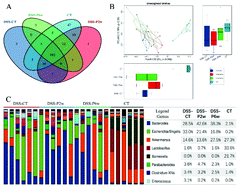Long-term and continuous administration of Bacillus subtilis during remission effectively maintains the remission of inflammatory bowel disease by protecting intestinal integrity, regulating epithelial proliferation, and reshaping microbial structure and function†
Abstract
Gut microbiota takes part in the pathogenesis of inflammatory bowel disease (IBD). Clinical research has found that probiotics have a beneficial effect on active ulcerative colitis, but to date, significant efficacy has rarely been found in the use of probiotics in the remission phase of ulcerative colitis and Crohn's disease. More studies are needed to assess the utilization of probiotics in IBD remission. In this study, we assessed the administration of Bacillus subtilis in remission and its possible mechanism in mice with IBD. Oral administration of B. subtilis was implemented for 6 weeks (dextran sulfate sodium (DSS)-P6w group), 2 weeks (DSS-P2w group) or 0 weeks (DSS-control(CT) group) in the remission phase in rodents with (DSS)-induced IBD. The body weight, colon length and disease activity index (DAI) were recorded, and colon H&E staining was performed. The expression of tight junction proteins (ZO-1 and occludin) mRNA and epithelium proliferation-related Ki67 was detected. Gut microbiota were tested by 16S rRNA sequencing. Administration of B. subtilis in remission effectively increased the body weight and colon length and decreased DAI in the DSS-P6w group compared with the DSS-CT group, but there is no significant difference between the DSS-P2w and DSS-CT groups. The epithelial integrity was improved, and the expression of ZO-1 and occludin increased due to administration of B. subtilis in remission, which was more evident in the DSS-P6w group. The expression of Ki67 increased in the DSS-CT group compared with that in the CT group. The administration of B. subtilis effectively down-regulated the expression of Ki67 in the DSS-P6w and DSS-P2w groups compared with the DSS-CT group. Furthermore, gut microbial structure was improved, with significantly decreased Escherichia/Shigella and Enterococcus, and increased Akkermansia and corresponding microbial function in the DSS-P6w group. Short-term administration of B. subtilis in the remission phase showed no significant improvement in mice with IBD. Long-term and continuous supplementation of B. subtilis in remission could effectively maintain the remission by protecting epithelial integrity, regulating proliferation of intestinal epithelial cells, and improving gut microbiota and the corresponding microbial function.



 Please wait while we load your content...
Please wait while we load your content...